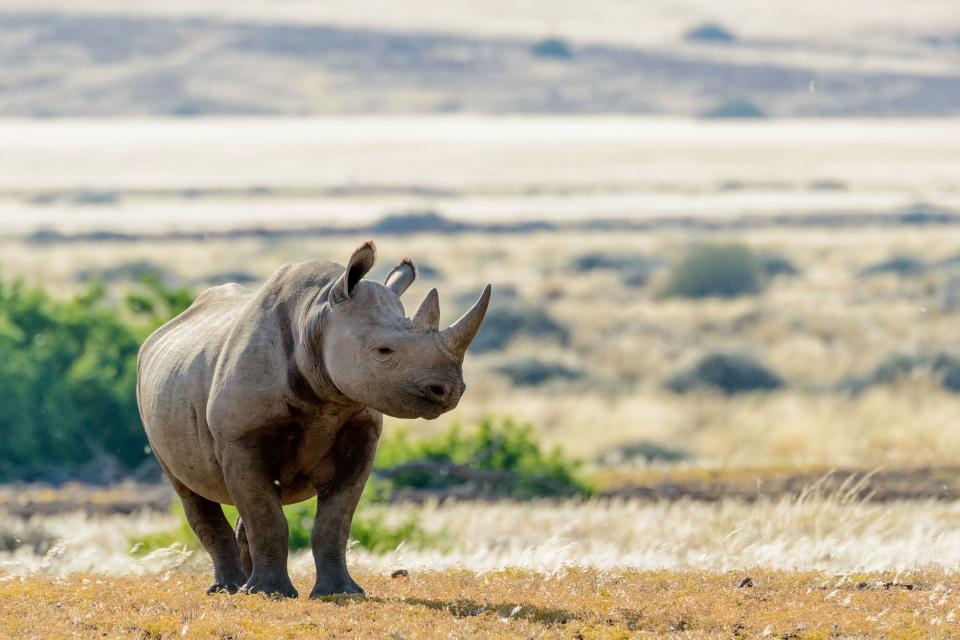A Trophy Hunter Paid $400,000 To Shoot A Rhino. Now He Wants To Bring It Home.
The Trump administration said this month it plans to issue a permit to an American trophy hunter hoping to bring back the skin and skull of a rhino he paid $400,000 to kill in Namibia last year.
The Humane Society of the United States said last week it had been notified by the U.S. Fish and Wildlife Service that it intended to grant the permit to Chris Peyerk, a businessman in Michigan, who shot the 29-year-old male black rhino in May 2018. Peyerk reportedly paid hundreds of thousands of dollars to a Namibian anti-poaching fund set up by the government in order to get permission to hunt the animal.
It’s illegal to import such animals or their parts into the United States under the provisions of the Endangered Species Act. For any permit to be issued, a trophy hunter needs to prove that their actions “will enhance the species’ survival” and take into account its “biological needs.” Trophy hunters have long argued that paying for the privilege to hunt endangered animals — which can cost tens if not hundreds of thousands of dollars — helps ensure their protection. But environmental groups have countered that a dead rhino is a dead rhino, regardless of how much money goes to conservation groups.
“We urge our federal government to end this pay-to-slay scheme that delivers critically endangered rhino trophies to wealthy Americans while dealing a devastating blow to rhino conservation,” Kitty Block, president of the Humane Society of the United States, said in a statement. “With fewer than 2,000 black rhinos left in Namibia — and with rhino poaching on the rise — now is the time to ensure that every living black rhino remains safe in the wild. … Black rhinos must be off limits to trophy hunters.”

If the permit is ultimately approved, it would be the sixth allowed by Fish and Wildlife since 2013 and the third under President Donald Trump. The New York Times notes that the permits had been largely shelved for three decades until former President Barack Obama’s administration issued three of them during his final term as black rhino populations recovered.
A spokeswoman for the agency defended its policies of issuing permits for hunting trophies to The Associated Press, saying: “Legal, well-regulated hunting as part of a sound management program can benefit the conservation of certain species by providing incentives to local communities to conserve the species and by putting much-needed revenue back into conservation.”
Trump and his family have also come under fire in the past for their proclivity for hunting big game. Both of the president’s sons, Eric Trump and Donald Trump Jr., have been photographed with dead wildlife from trophy hunts, although the president has called the hobby a “horror show.”
Namibia is home to about half of the world’s remaining black rhinos, and the country is allowed under international law to issue five permits for hunters to kill a male rhino each year. Black rhinos are listed as critically endangered by the International Union for the Conservation of Nature, but the AP notes Peyerk’s application said he hunted a subspecies known as the south-western black rhinoceros, which is listed as “vulnerable,” a less-threatened designation.
While conservation measures have improved in recent years and rhino populations have been growing, the animals are still poached for their horns, which are prized in some Asian countries as a traditional medicine and status symbol that can be worth more than its weight in gold. Rhino horn, however, is largely made up of keratin, the same component as human hair and fingernails.
It has no medicinal value.
Related...
With Death Of Malaysia's Last Male Sumatran Rhino, Another Species Is Almost Extinct
These Women Risk Their Lives To Save Rhinos And Elephants From Poachers
More Than 10,000 Wild Animals Seized In Massive Interpol Anti-Smuggling Operation
Love HuffPost? Become a founding member of HuffPost Plus today.
This article originally appeared on HuffPost.

